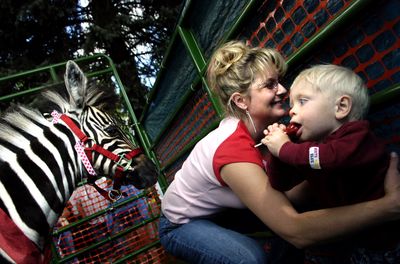Beloved mental health zebra dies
Maggie Mae was used in therapy

She dressed as a fairy princess for Halloween. She liked to curl up on the floor and watch a movie with her family. Her best friend was the palomino mare, Lady, but she had many other friends and admirers throughout North Idaho.
Maggie Mae – the Mental Health Zebra, as she was known – touched everyone she met. On Dec. 15, Maggie Mae died from colic. A memorial service is scheduled for Saturday.
“We brought Maggie home as a baby,” said Kristina Nicholas Anderson, a mental health therapist and program director of Diversified Social Services Inc. in Dalton Gardens. “I did round-the-clock, two-hour feedings, and I slept in the barn with her every night for the first six months we had her.”
Maggie lived to be 2 1/2 and was an integral part of Nicholas Anderson’s work.
“I’ve cried a lot of tears and so have many of our patients and our neighbors,” she said. “The bond I had with her was unreal. You didn’t need a halter; she’d come to a whistle. She’d play with our own dog, but stray dogs she’d chase up to the property line.”
Maggie may have been the only zebra ever used in an equine- assisted therapy program, Nicholas Anderson said.
Zebras are related to horses and can breed with them, yet conventional wisdom is that zebras usually are difficult if not impossible to domesticate.
“They are wild animals, so we were much more cautious with Maggie. No one was allowed in the arena with her alone,” said Nicholas Anderson, adding that Maggie was very gentle and didn’t bite or kick.
A certified equine-assisted mental health therapist, Nicholas Anderson often works with people who have borderline personality disorders.
“They tend to see everything as black or white, and I thought how appropriate to have Maggie with her black and white stripes,” Nicholas Anderson said. That’s why Maggie’s profile was incorporated into Diversified Social Services’ logo.
During equine-assisted therapy sessions, clients are on the ground but interacting with or using the horses around them as metaphors for what’s going on in life.
“We couldn’t quite use Maggie like that, but she was brutally honest – you knew right away if she had a problem with you,” Nicholas Anderson said.
Lady, the palomino mare with whom Maggie bonded, recently was euthanized after a long battle with arthritis, and Maggie’s behavior changed.
“We are thinking she was depressed, she was grieving,” Nicholas Anderson said. The miniature ponies that had been part of Maggie’s herd began rejecting her.
“Maggie got anxious, she began eating alone. I thought maybe she was getting a cold, and I took her to the veterinarian,” Nicholas Anderson said. Maggie had a bit of conjunctivitis, but was otherwise pronounced in excellent health.
Somewhat at ease, Nicholas Anderson got Maggie a warm winter blanket to make sure she wouldn’t get cold and wet in the snow.
“That Monday was when that first big snow storm hit, and I couldn’t take her to work with me because it wasn’t safe to pull the trailer,” said Nicholas Anderson. “When we got home, she had gone into her stall and died.”
A veterinarian determined the cause of death as colic.
“We still believe her grieving was a big part of her death,” Nicholas Anderson said. “It’s just like us humans: When we are upset we don’t eat and drink properly.”
Maggie is now buried beside Lady on Nicholas Anderson’s property.
“We had brand new wooden crosses made for them,” she said, emotion in her voice.
Nicholas Anderson said the pain of losing Maggie has left her devastated.
“I mean, I’d feed her a bottle sitting in the rocking chair. She’d come into the house,” Nicholas Anderson said. “With another zebra I’d probably be careful forming such a strong bond.”
Come spring, Maggie’s Columbia Basin-based breeder will send some zebra colts up to Nicholas Anderson for training.
Nicholas Anderson said she heard from so many people who’ve been touched by Maggie that she decided to have a public memorial service.
“Maggie was a pet, but she was much more than that,” she said. “She was a colleague and a friend to me.”